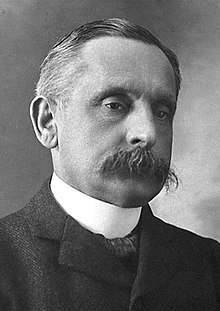Paul Henri Balluet d'Estournelles de Constant
This article includes a improve this article by introducing more precise citations. (April 2016) ) |
Paul d'Estournelles de Constant | |
|---|---|
 | |
| Personal details | |
| Born | Paul Henri Benjamin Balluet d'Estournelles de Constant de Rebecque 22 November 1852 La Flèche, France |
| Died | 15 May 1924 (aged 71) Paris, France |
| Occupation | Diplomat |
| Awards | Nobel prize 1909 for Peace |
Paul Henri Benjamin Balluet d'Estournelles de Constant, Baron de Constant de Rebecque (22 November 1852 – 15 May 1924), was a French diplomat and politician, advocate of international
Biography

He was born at La Flèche (Sarthe) in the Loir valley to the Constant de Rebecque family; the renowned Revolution-era writer and politician Benjamin Constant was his great-uncle. After studying law and Oriental languages at the Lycée Louis-le-Grand in Paris, Estournelles de Constant embarked on a diplomatic career in 1876.
Among Estournelles de Constant's early diplomatic posts were

As a deputy and senator, Estournelles de Constant concerned himself with colonial issues, consistently opposing
Above all, though, Estournelles de Constant dedicated himself to the cause of improving international relations, and he was a member of the
Estournelles de Constant wrote historical and political works and even dabbled in playwriting. In addition, he was a regular contributor to the newspapers
Estournelles de Constant's name may be encountered in numerous variants; the article title reflects the form standardized by the Bibliothèque nationale de France.
From 1904, and more officially from 1905, Paul d'Estournelles de Constant chaired the Association de Conciliation Internationale, with which he tried to influence international policies towards arbitration, disarmament and peace16.
Estournelles de Constant was elected an International Member of the American Philosophical Society in 1907.
In 1899, then in 1907, Paul d'Estournelles de Constant represented France, with Léon Bourgeois and Louis Renault, at the Hague Conferences. Its aim is to work for the peaceful settlement of international conflicts by promoting mediation, and especially international arbitration. He helped Léon Bollée, the main supporter of the American Wilbur Wright, an aviation pioneer, in his aeronautical experiments carried out between August 8, 1908 and January 2, 1909, at Le Mans and in Sarthe, on the Hunaudières racecourse then at the Auvours military camp.
Paul d'Estournelles de Constant receives the Nobel Peace Prize on December 10, 1909, jointly with the Belgian deputy Auguste Beernaert, for their efforts in the construction of international law, in particular in the organization of the conferences of The Hague of 1899 and 1907 which lead to the creation of a Permanent Court of Arbitration17. He was the third Frenchman to receive this distinction after Frédéric Passy, in 1901, and Louis Renault, in 1907. The news of this appointment had little echo in the national press, because only the newspaper La Croix announced it on the front page. 17.[2][circular reference]
Posterity

In La Flèche (Sarthe), his hometown, two schools bear his name: the Estournelles de Constant General and Technological High School, and the Estournelles de Constant Kindergarten.
An amphitheatre bears his name at the UFR (Training and Research Unit) of Law, Economic Sciences and Management of the
A monument, including a bust by
Sources
- Jolly, Jean, dir. Dictionnaire des parlementaires français: Notices biographiques sur les ministres, députés et sénateurs français de 1889 à 1940. 6 vols. Paris: Presses universitaires de France, 1960–70.
- "Paul Henri d'Estournelles de Constant—Biography".
Further reading
- Stéphane Tison (ed.), Paul d'Estournelles de Constant. Concilier les nations pour éviter la guerre (1878-1924), Rennes, Presses universitaires de Rennes, 2015.
- Laurent Barcelo, Paul d'Estournelles de Constant : L'expression d'une idée européenne, Paris, L'Harmattan, 1995.
Notes
- ^ "Paul Henri d'Estournelles de Constant – Biographical. NobelPrize.org. Nobel Media AB 2018". 25 Sep 2018 – via NobelPrize.org.
- ^ fr:Paul Henri Balluet d'Estournelles de Constant#Postérité
External links
- Report of the International Commission to Inquire into the Causes and Conduct of the Balkan Wars. Washington, D.C.: Carnegie Endowment for International Peace. 1914. Retrieved 27 September 2018 – via Internet Archive.
- Newspaper clippings about Paul Henri Balluet d'Estournelles de Constant in the 20th Century Press Archives of the ZBW
- Paul Henri Balluet d'Estournelles de Constant on Nobelprize.org
- Works by or about Paul Henri Balluet d'Estournelles de Constant at Internet Archive
